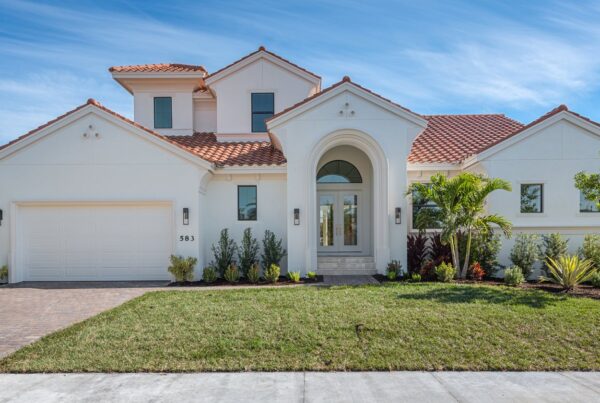
You wouldn’t buy a car without checking its history, so why would you choose a builder without doing your homework? For most homeowners in Southwest Florida, selecting the right custom home builder represents the largest investment of their lifetime. Yet too often, people rely solely on online reviews or a friend’s recommendation, missing crucial insights that could save them from costly mistakes and heartache.
The truth is, a systematic approach to researching your builder’s reputation will give you the confidence to move forward with your dream home project. These eight proven research methods go far beyond surface-level reviews to provide the complete picture you need.
When you take the time to thoroughly investigate your potential builder, you’re not just protecting your investment – you’re ensuring peace of mind throughout your home building journey.
Start with Official Licensing and Credentials
Before you fall in love with beautiful model homes or compelling sales presentations, your first stop should always be verifying your builder’s legal standing and professional credentials.
Florida State Licensing Board Verification
Every legitimate contractor in Florida must hold a valid license through the Department of Business and Professional Regulation. Visit the Florida Department of Business and Professional Regulation website and search for your prospective builder’s license number. This search reveals crucial information, including license status, expiration dates, and any disciplinary actions.
Pay close attention to the disciplinary history section. Minor violations that were quickly resolved show a builder who takes compliance seriously. However, multiple violations, license suspensions, or unresolved complaints should raise immediate red flags. A clean record spanning decades indicates consistent professional operation.
Professional Association Memberships
Builders who maintain memberships in professional organizations demonstrate their commitment to industry standards and continuing education. Look for memberships in the National Association of Home Builders or local chapters like the Lee Building Industry Association or Collier Building Industry Association.
These memberships aren’t just titles – they require ongoing education, adherence to codes of ethics, and peer accountability. When a builder invests in professional development and industry involvement, it signals their dedication to staying current with best practices and building codes.
Dig Deeper into Online Reviews and Ratings
While online reviews provide valuable insights, knowing how to interpret them properly separates amateur research from professional due diligence.
A 4.5 to 5-star average on Google Reviews is excellent, but the real story lies in reading actual review content and patterns. Look for specific mentions of quality, communication, and problem resolution. Recent reviews carry more weight than older ones, especially in the construction industry, where teams and processes evolve.
Pay attention to how builders respond to reviews. Professional, thoughtful responses to both positive and negative feedback show a company that values customer relationships and takes accountability seriously. Frey & Son’s approach to customer feedback reflects this commitment to treating every client like family.
Cross-platform consistency tells the real story. Check Google, Facebook, and others for a complete picture. Be wary of builders with glowing reviews on only one platform, as this could indicate review manipulation.
Look for organic, detailed reviews that mention specific aspects of the building process. Generic five-star reviews without details are less valuable than thoughtful four-star reviews that discuss both positives and how any challenges were handled.

Evaluate How Builders Respond to Challenges
Every construction project faces unexpected challenges, from weather delays to material shortages. How your builder handles these situations reveals their true character and professional competence.
Examine how builders address negative reviews or complaints. Do they respond defensively, or do they acknowledge concerns and explain their resolution process? Professional builders view challenges as opportunities to demonstrate their commitment to customer satisfaction.
During your conversations with potential builders, ask directly how they handle common construction delays or change orders. A builder with decades of experience should have clear, systematic approaches to managing these situations while keeping clients informed throughout the process.
Normal Construction Challenges vs. Red Flags
Understanding the difference between normal construction issues and serious red flags protects you from making costly mistakes. Expected challenges include weather-related delays, material substitutions due to supply chain issues, and minor plan modifications during construction.
Serious red flags include multiple licensing problems, abandoned projects, ongoing legal disputes, or consistent patterns of cost overruns without explanation. Florida’s contractor licensing database helps you identify these concerning patterns before you sign any contracts.
Request and Verify References Directly
Smart buyers don’t just accept a list of references; they actively seek out and contact recent customers to learn about their real experiences.
Request contact information for customers whose homes were completed within the past 12 months. Recent references provide the most relevant insights into current quality standards, communication practices, and project management systems.
When speaking with references, ask specific questions:
- How did the builder handle unexpected challenges?
- Was the project completed on time and within budget?
- How responsive was the team to questions and concerns?
- Would they choose the same builder again?
These conversations often reveal details that don’t appear in formal reviews.
Drive by Completed Projects
There is something to be said for seeing actual workmanship in person. Ask your potential builder for addresses of completed projects in your target communities. Drive through these neighborhoods at different times of day to observe how well the construction has held up over time.
Look for signs of quality construction: straight lines, proper drainage, well-maintained landscaping, and homes that complement their surroundings. This visual inspection gives you confidence that your investment will maintain its value and beauty for years to come.
Research Builder’s Portfolio and Past Projects
A builder’s portfolio reveals their capabilities, aesthetic sensibilities, and commitment to quality craftsmanship better than any sales presentation.
Study the builder’s website galleries and marketing materials, but focus on construction details rather than just beautiful staging. Look for consistency in finish quality across different price points and styles. Pay attention to details like trim work, tile installation, and outdoor living space construction.
Quality builders showcase their work proudly and provide detailed case studies that explain their construction processes. Professional portfolios demonstrate not just pretty pictures, but the craftsmanship and attention to detail that should go into every project.
Research Financial Stability and Business Practices
A builder’s financial stability directly impacts their ability to complete your project with quality and professionalism throughout the construction process.
Years in Business and Project Volume
While longevity doesn’t necessarily guarantee quality, it does indicate the ability to survive market fluctuations and maintain customer satisfaction over time. Builders who have operated successfully for decades, particularly through economic challenges, demonstrate resilience and business acumen.
Research not just how long they’ve been in business, but their project volume and growth patterns. The sweet spot is a builder who is established and experienced but not overwhelmed with so many projects that quality or personal attention suffers.
Local Community Standing
Investigate your builder’s reputation within the local construction and real estate community. Long-term relationships with suppliers, subcontractors, and real estate professionals indicate reliability and fair business practices.
Check with local real estate agents, architects, and other construction professionals about the builder’s reputation. Community involvement through sponsorships, charitable activities, or industry leadership roles also reflects a company’s commitment to the area where you’re building your dream home.
Schedule In-Person Meetings and Model Home Visits
Nothing replaces face-to-face interaction for evaluating whether a builder is the right partner for your family’s most important investment.
Evaluate Communication Style
Pay attention to how responsive potential builders are to your initial inquiries.
- Do they return calls promptly?
- Are they willing to spend time answering your questions thoroughly?
- Do they explain complex construction concepts in terms you can understand?
The way a builder communicates during the sales process often reflects how they’ll communicate throughout construction. Look for builders who treat you like a valued family member from the first conversation, not just another transaction to close.
Model Home Experience Quality
The model home experience reveals much about a builder’s attention to detail and quality standards. Examine not just the obvious showcase features, but the details that matter daily. These are things like cabinet hardware operation, door and window quality, electrical outlet placement, and storage solutions.
Ask detailed questions about the construction process, materials used, and customization options. Knowledgeable staff who can explain these technical aspects demonstrate a company’s depth of expertise and commitment to educating their clients throughout the building process.
Trust Your Instincts While Staying Objective
After completing thorough research, balance your analytical findings with your gut feelings about the people and company you’ll be partnering with for months.
Building a custom home is both a significant financial investment and an emotional journey. While facts and research should guide your decision, don’t ignore legitimate concerns that arise during your evaluation process.
If something feels off during your research – whether it’s evasive answers, pressure tactics, or inconsistencies in information – investigate further. Your instincts, combined with thorough research, provide the best foundation for confident decision-making.
Develop a systematic way to compare different builders based on your priorities. Weight factors like reputation, communication style, portfolio quality, and pricing according to what matters most to your family’s needs and preferences.
An objective scoring system helps you move beyond emotional reactions to make decisions based on facts and alignment with your values. Remember, the lowest price rarely delivers the best long-term value for luxury custom home construction.
Make Your Decision with Confidence
Thorough research isn’t just about avoiding problems – it’s about finding the right partner who will transform your vision into the home where your family will create lasting memories. When you’ve systematically evaluated licensing, references, portfolio quality, and personal compatibility, you can move forward with confidence.
Taking time to research properly is an investment in your peace of mind throughout the building process. The right builder will welcome your thorough approach and provide all the information you need to make an informed decision.
When you choose the right builder through careful research, you’re not just building a house – you’re creating the foundation for your family’s future happiness and your home’s lasting legacy.












